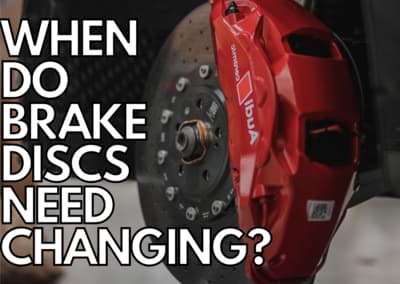When do brake discs need changing?
Brake discs are an essential component of the braking system, along with the brake callipers and brake pads, they all work in harmony to bring your car to a halt when you press the brake pedal down. The braking system works by the callipers pushing the brake pads against the brake disc. This in turn generates friction with the brake disc and brings the vehicle to a controlled stop, despite it travelling at high speeds.
With all of this being said, and brake discs proving to be so essential for performance, operation and safety, how do so many people not know when to change their brake discs?
In this article, we are going to address when you should change your brake discs and answer some related frequently asked questions.

How do I know if my brake discs are worn?
With all the components of the braking system, including the discs, callipers and pads, there are tell-tale signs that one of these components are worn and need changing.
These signs include –
- Steering wheel wobbles when driving
- Brake pedal is less responsive
- Brake performance reduced
- Warped brake disc
- Grinding sound when braking
It is easier to identify when your brake pads need changing more than the brake disc. If you notice any of the signs listed, there is a possibility that it could be worn brake pads as they share the same tell-tale signs as worn brake discs. If you notice any of these signs you should get your brakes checked straight away.
How often should you change brake discs?
When brake discs are brand new, they come at a thickness that is determined by the manufacturer based on the expected friction from the brake pads and the forces and heat exerted on the brake discs. It's recommended that you get your brake discs changed when they reach this minimum thickness.
Not sure what your minimum brake disc thickness is? Book a brake check at your local National Tyre garage and one of our experts will take a look.
Book a brake check
Or for a more thorough car check, book a Car Safety Inspection for a comprehensive 30-point check of your vehicle's health.
Can you drive with bad brake discs?
Driving with damaged disc brakes is a hazard as it affects the performance of your braking. If your braking performance is reduced this can have serious consequences, putting yourself and other drivers in danger.
How many miles do brake discs last?
As previously stated, the recommended thickness of the brake discs varies depending on the manufacturer of the vehicle. You can find this information in the vehicle handbook or by querying with your car manufacturer. As a rough estimate, you can expect your brake discs to have a lifetime of around 80,000 – 120,000 miles.
Related: How long do car tyres last?
Can you replace brake discs without pads?
Brake discs are a lot more resilient than brake pads as brake discs are constructed of cast iron in most circumstances. When it is time to change your brake discs it is recommended that you also get your brake pads changed at the same time. This is so the braking system is fully rejuvenated and you get the most out of your brakes.
Related: Do I need new brake pads?
Are worn brake discs an MOT failure?
During an MOT test, the wheel is not taken off to get a full inspection of the brake discs, pads and callipers. Due to this reason, the brakes cannot fail an MOT on a visible inspection. However, a braking test is conducted and if the brake disc or pads are worn, this can lead to a failure in this test, leading to an overall failure of the MOT.
Related: Common MOT failures
When reading this article, you may realise that your car is displaying the tell-tale signs that your brake discs or pads are worn or you are overdue getting these components changed. If this is the case, it is essential that you book into one of our 250 nationwide garages and get your brakes checked by a professional.
Did you enjoy this blog post? |42 people found this review helpful



 Sign up for SPECIAL OFFERS
Sign up for SPECIAL OFFERS
